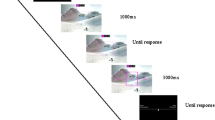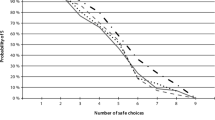Abstract
Building upon previous research, this article proposes that the effect of mood on risk-taking is moderated by the individual’s need for cognition. The hypothesized effect of mood and the need for cognition are tested with different types of consumer choices in three studies. Consistent with the hypotheses, the results indicate that the subjects in happy mood tend to be risk-aversive while the subjects in sad mood incline to take risks. Furthermore, the mood affects risk-taking behavior more for the low-NFC subjects than for the high-NFC ones. Finally, implications of the findings and suggestions for future research are discussed.
Similar content being viewed by others
References
Adaval, R. (2003). How Good Gets Better and Bad Gets Worse: Understanding the Impact of Affect on Evaluations of Known Brands. Journal of Consumer Research, 30, 352–367.
Batra, R., & Stayman, D. M. (1990). The Role of Mood in Advertising Effectiveness. Journal of Consumer Research, 17(2), 203–214.
Begley, S. (2004). How Do You Keep the Public Shopping? Just Make People Sad. Wall Street Journal (Eastern edition), 19th, B1.
Belk, R. W. (1975). Situational Variables and Consumer Behavior. Journal of Consumer Research, 2, 157–174.
Berkowitz, L., Jaffee, S., Jo, E., & Troccoli, B. T. (2000). On the correction of feeling induced judgmental biases, In J.P. Forgas (Ed.), Feeling and thinking: The role of affect in social cognition (pp. 131–152). New York: Cambridge University Press.
Bettman, J. R., Luce, M. F., & Payne, J. W. (1998). Constructive consumer choice process. Journal of Consumer Research, 25, 187–217.
Bhattacharjee, S., & Moreno, K. (2002). The Impact of Affective Information on the Professional Judgments of More Experienced and Less Experienced Auditors. Journal of Behavioral Decision Making, 15 (4), 361–377.
Cacioppo, J. T., & Petty, R. E. (1982). The need for cognition. Journal of Personality and Social Psychology, 42, 116–131.
Cacioppo, J. T., Petty, R. E., & Kao, C. F. (1984). The efficient assessment of need for cognition. Journal of Personality Assessment, 48, 306–307.
Cacioppo, J. T., Petty, R. E., Kao, C. F., & Rodriguez, R. (1986). Central and peripheral routes to persuasion: An individual difference perspective. Journal of Personality and Social Psychology, 51, 1032–1043.
Cacioppo, J. T., Petty, R. E., & Morris, K. J. (1983). Effects of need for cognition on message evaluation, recall, and persuasion. Journal of Personality and Social Psychology, 45, 805–818.
Chernev, A. (2004). Goal-attribute compatibility in consumer choice. Journal of Consumer Psychology, 14(1–2), 141–150.
Dhar, R., & Simonson, I. (2003). The effect of forced choice on choice. Journal of Marketing Research, 146–160.
Dhar, R., Nowlis, S. M., & Sherman, S. J. (2000). Trying hard or hardly trying: An analysis of context effects in choice. Journal of Consumer Psychology, 9, 189–200.
Festinger, L. (1964). Conflict, decision and dissonance. Stanford, CA: Stanford University Press.
Forgas, J. P. (1991). Mood effects on partner choice: Role of affect in social decisions. Journal of Personality and Social Psychology, 61, 708–720.
Forgas, J. P., & Ciarrochi, J. (2001). On being happy and possessive: The interactive effects of mood and personality on consumer judgments. Psychology & Marketing, 18, 239–260.
Forgas, J. P. (1998). Happy and mistaken? Mood effects on the fundamental attribution error. Journal of Personality and Social Psychology, 75, 318–331.
Forgas, J. P. (2000) (Ed.), Feeling and thinking: The role of affect in social cognition. Cambridge: Cambridge University Press.
Gardner, M. P., & Vandersteel, M. (1984). The consumer's mood: An important situational variable. Advances in Consumer Research, 6, 525–529.
Haugtvedt, C. P., Petty, R. E., & Cacioppo, J. T. (1992). Need for cognition and advertising: Understanding the role of personality variables in consumer behavior. Journal of Consumer Psychology, 1, 239–260.
Haugtvedt, C. P., & Petty, R. E. (1992). Personality and persuasion: Need for cognition moderates the persistence and resistance of attitude changes. Journal of Personality and Social Psychology, 63, 308–319.
Heppner, P. P., Reeder, B. L., & Larson, L. M. (1983). Cognitive variables associated with personal problem solving appraisal: Implications for counseling. Journal of Counseling Psychology, 30(1), 537–545.
Hockey, G. R. J., Maule, A. J., Clough, P. J., & Bdzola, L. (2000). Effects of negative mood states on risk in everyday decision making. Cognition and Emotion, 14, 823–855.
Huber, J., & Puto, C. (1983). Market boundaries and product choice: Illustrating attraction and substitution effect. Journal of Consumer Research, 10, 31–44.
Isen, A. M. (1984). Towards understanding the role of affect in cognition. In R.S. Wyer & T. K. Srull (Eds.), Handbook of social cognition, 3, 179–236). Erlbaum: Hillsdale, NJ.
Isen, A. M., & Geva, N. (1987). The influence of positive affect on acceptable level of risk: The person with a large canoe has a large worry. Organizational Behavior and Human Decision Processes, 39, 145–154.
Isen, A. M., & Patrick, R. (1983). The effects of positive affect on risk-taking: When the chips are down. Organizational Behavior and Human Decision Processes, 31, 194–202.
Kuvaas, B., & Kaufmann, G. (2004). Impact of mood, framing, and need for cognition and decision makers' recall and confidence. Journal of Behavioral Decision Making, 17, 59–74.
Lazarus, R. S. (1991). Emotion and adaptation. New York, NY: Oxford University Press.
Leith, K. P., & Baumeiser, R. F. (1996). Why Do Bad Moods Increase Self-Defeating Behavior? Journal of Personality and Social Psychology, 71, 1250–1267.
Luomala, H. T., & Laaksonen, M. (2000). Contributions from mood research. Psychology & Marketing, 17, 195–233.
Lutz, R. J., & Kakkar, P. (1975). Toward a Taxonomy of Consumption Situations. In Edward M. Mazze (Ed.), Marketing in turbulent times (pp. 206–210). Chicago, IL: American Marketing Association.
Mano, H. (1992), Judgements Under Distress: Assessing the role of unpleasantness and arousal in judgement formation. Organizational Behavior and Human Decision Processes, 52, 216–245.
Mano, H. (1994). Risk-taking, framing effect, and affect. Organizational Behavior and Human Decision Processes, 57, 38–58.
Martin, L. L. (2000). Moods don't convey information: Moods in context do. In J.P. Forgas (Ed.), Feeling and thinking: The role of affect in social cognition. New York: Cambridge University Press.
Mittal, V., & Ross, W. T. J. (1998). The impact of positive and negative affect and issue framing on issue interpretation and risk taking. Organizational Behavior and Human Decision Processes, 76, 298–324.
Ortony, A., Clore, G., & Collins, A. (1988). The Cognitive Structure of the Emotions. New York: Cambridge University Press.
Raghunathan, R., & Pham, M. T. (1999). All negative moods are not equal: Motivational influences of anxiety and sadness on decision making. Organizational Behavior and Human Decision Processes, 79, 56–77.
Roseman, I. J. (1991). Appraisal Determinants of Discrete Emotions. Cognition and Emotion, 5(3), 161–200.
Rusting, C. L. (1998). Personality, mood and cognitive processing of emotional information: Three conceptual frameworks. Psychological Bulletin, 124, 165–196.
Shafir, E. (1993). Choosing versus rejecting: Why some options are both better and worse than others. Organizational Behavior and Human Decision Processes, 55, 325–378.
Simonson, I. (1989). Choice based on reasons: The case of attraction and compromise effects. Journal of Consumer Research, 16, 158–174.
Simonson, I., & Nowlis, S. M. (2000). The Role of Explanations and Need for Uniqueness in Consumer Decision Making: Unconventional Choices Based on Reasons. Journal of Consumer Research, 27, 49–68.
Weinberg, P., & Gottwald, W. (1982). Impulsive Consumer Buying as a Result of Emotions. Journal of Business Research, 10, 43–57.
Simonson, I., & Tversky, A. (1992). Choice in context: Tradeoff contrast and extremeness aversion. Journal of Marketing Research, 29, 281–295.
Westbrook, R. A. (1980). Intrapersonal Affective Influences upon Consumer Satisfaction with Products. Journal of Consumer Research, 7, 49–54.
Zhang, Y. (1996). Responses to Humorous Advertising: The Moderating Effect of Need for Cognition. The Journal of Advertising, 15(1), 15–32.
Author information
Authors and Affiliations
Corresponding author
Rights and permissions
About this article
Cite this article
Lin, CH., Yen, H.R. & Chuang, SC. The effects of emotion and need for cognition on consumer choice involving risk. Market Lett 17, 47–60 (2006). https://doi.org/10.1007/s11002-006-4146-2
Issue Date:
DOI: https://doi.org/10.1007/s11002-006-4146-2




